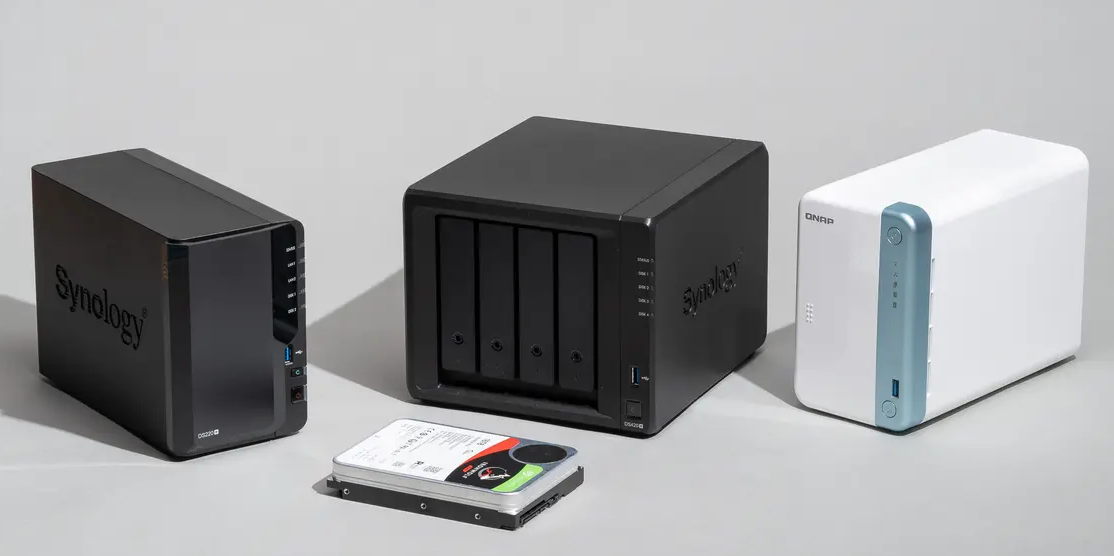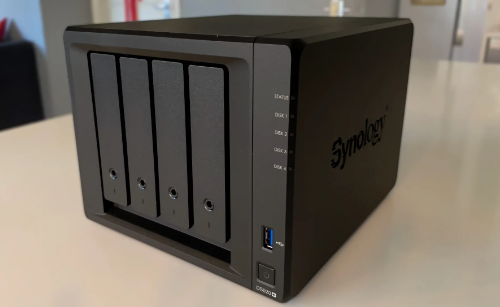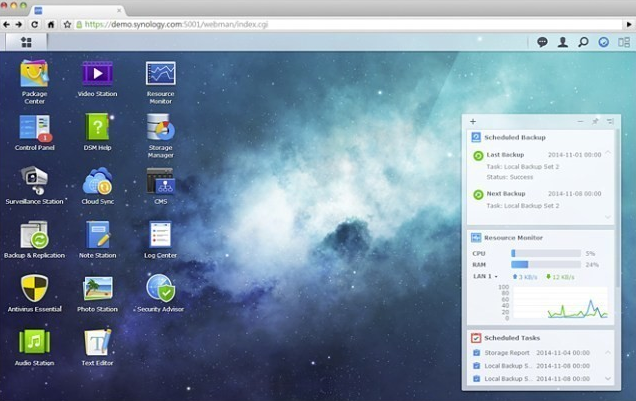Synology NAS is a centralized storage solution that allows users to store, access, and manage data securely. It offers multimedia streaming, file sharing, and backup options, making it ideal for both personal and business use.
Introduction to Network Attached Storage (NAS)
Network Attached Storage, commonly referred to as NAS, has become a pivotal asset for many homes and businesses. This section delves into the evolution of NAS technology and the prominent rise of Synology within the industry.
Brief history of NAS technology
The concept of NAS began in the 1980s as companies sought more efficient ways to access, share, and backup their increasing amounts of data. Originally, data was stored on large, centralized mainframes. However, with the demand for more decentralized and flexible storage solutions, the NAS was born. By the 1990s, NAS solutions became commercially available, providing businesses with the opportunity to store data on dedicated devices connected directly to their networks.
One significant advantage of early NAS systems was their simplicity. They were easier to set up and manage than traditional file servers. Despite this, early NAS systems had limitations in terms of speed and scalability, which were later addressed as technology progressed.
The rise of Synology in the NAS industry
Synology entered the NAS scene in 2000, offering innovative solutions that quickly positioned them as industry leaders. Their commitment to research and development led to the creation of user-friendly interfaces, advanced security measures, and highly scalable storage solutions. The brand's emphasis on reliability, coupled with competitive pricing, made Synology a preferred choice for both home users and businesses.
While competitors focused primarily on hardware, Synology's approach encompassed both hardware and software. Their DiskStation Manager (DSM) interface revolutionized the way users interacted with their NAS devices, offering intuitive navigation, advanced features, and robust security options.
To understand the impact and significance of Synology in the world of NAS, it's essential to explore its core functions, advantages, and applications in various environments, which we will delve into in the following sections.

Core Functions of Synology NAS
Synology NAS, with its multifaceted offerings, plays a critical role in modern data management. Let's delve deeper into its core functions and why they stand out in the contemporary tech landscape.
Centralized data storage
Centralizing data is one of the primary purposes of any NAS system, and Synology excels in this domain. With Synology NAS, users can:
- Streamline Data Access: By storing all files in one location, users can swiftly locate and access their data without shuffling through multiple devices.
- Optimize Space: Efficiently utilize storage capacity by eliminating redundant copies of files across various devices.
- Expand Storage: Easily add more drives or upgrade existing ones without much hassle, ensuring the system grows with user needs.
Backup solutions for home and businesses
Backup is a non-negotiable aspect of data management. Synology provides robust solutions tailored for both home and commercial settings:
- Scheduled Backups: Automate backups to occur at specified intervals, ensuring data remains current.
- Multi-version Backup: Store multiple versions of files, allowing users to revert to previous states if needed.
- Remote Backup: Backup data to another offsite Synology NAS, safeguarding against local disasters like fires or floods.
File sharing and collaboration
In today's interconnected world, seamless collaboration is a must. Synology makes file sharing both secure and straightforward:
- Link Sharing: Generate secure links for files or folders, which can be shared with external parties.
- Access Rights Management: Define who can access what, ensuring data remains in the right hands.
- Real-time Collaboration: Work on documents simultaneously with colleagues, enhancing productivity.
Multimedia server capabilities
Synology isn't just about work; it's also about play. Their NAS systems double up as potent multimedia servers:
- Photo Station: Organize, view, and share photos in a beautifully curated gallery.
- Video Station: Stream movies and TV shows directly from the NAS without needing to transfer files.
- Audio Station: Manage and play music collections, even streaming to different devices in a multi-room setup.
In conclusion, the core functions of Synology NAS not only simplify data storage but also transform the way we interact with our digital content, be it for work, backup, collaboration, or entertainment.
Advantages of Using Synology NAS
The Synology NAS offers a suite of advantages, making it a top choice for many individuals and businesses alike. Let's dive deep into these benefits to understand its value proposition better.
High data security measures
With the digital age comes the increased risk of cyber threats. Synology prioritizes user security with a range of features:
- Encryption: Leveraging advanced encryption algorithms, Synology ensures that data remains unreadable to unauthorized parties.
- Two-factor Authentication: Adds an extra layer of security by requiring a second form of verification besides just a password.
- Firewall & Auto-blocking: Monitors suspicious activity and blocks unauthorized access attempts.
- Security Advisor: An in-built tool that scans the system for vulnerabilities and provides recommendations for enhancing security.

Scalability and flexible storage solutions
Synology recognizes the evolving needs of its users and ensures its systems grow with them:
- Easy Expansion: Users can seamlessly add more storage by plugging in additional drives or using expansion units.
- Hybrid RAID: Synology’s proprietary RAID solution, SHR (Synology Hybrid RAID), automatically optimizes storage capacity and protection based on the hard drives used.
- Virtualization: Supports various virtualization solutions, enabling businesses to run multiple virtual machines and applications.
Eco-friendly and power-efficient operations
Synology's commitment to the environment is evident in its design choices:
- Low Power Consumption: On average, a Synology NAS consumes less than 30 watts during operation, reducing electricity costs.
- Scheduled Power On/Off: Allows users to set NAS to turn off during non-peak hours, further conserving energy.
- Noise Reduction: Designed with noise-dampening materials and efficient fans, ensuring quieter operations, especially important for home environments.
Intuitive DiskStation Manager (DSM) interface
The DSM interface stands as a testament to Synology's commitment to user experience:
- User-friendly Design: The interface is intuitive, resembling that of many desktop operating systems, making navigation a breeze.
- Rich Application Ecosystem: DSM supports a vast array of applications, from backup tools to multimedia apps, all available in the Package Center.
- Regular Updates: Synology regularly rolls out updates, ensuring users always have access to the latest features and security enhancements.
To wrap up, Synology NAS isn’t just about storage; it's about delivering a comprehensive solution that values security, flexibility, eco-friendliness, and a superior user experience.
Synology NAS in Various Environments
The versatility of Synology NAS ensures it finds applications in diverse environments, from personal home setups to expansive enterprise networks. Let's explore its role and significance in these varying contexts.
Home setups and personal usage
For many, Synology NAS is the digital heart of their homes:
- Media Center: With apps like Video Station, families can stream their favorite films and shows across devices, ensuring movie night is always a hit.
- Personal Cloud: Instead of relying on third-party cloud providers, users can create their own cloud, ensuring they have total control over their data.
- Smart Home Integration: Sync with smart devices like cameras or speakers, centralizing home automation and surveillance.

Small to medium-sized businesses
SMEs find a reliable partner in Synology:
- Collaborative Tools: With apps like Synology Office, teams can collaborate on documents in real-time, enhancing productivity.
- Centralized Backup Solution: Protect valuable business data with scheduled backups, ensuring data recovery in unforeseen situations.
- Remote Access: Employees can access files from anywhere, ensuring seamless workflow even if they're away from the office.
Enterprises and large corporations
For large organizations, Synology's scalability and robust features make it indispensable:
- High Scalability: With the ability to support petabytes of storage, Synology meets the demands of expansive data centers.
- Virtualization Ready: Supports running multiple virtual instances, streamlining IT operations and application management.
- Advanced Security Protocols: Enterprise-grade security features protect sensitive corporate data from potential breaches.
Educational institutions and research facilities
Education and research sectors benefit immensely from Synology's specialized features:
- Resource Sharing: Teachers and students can easily share study materials, research papers, and multimedia content.
- Database Management: Research facilities can organize vast amounts of data, making it easily accessible for further studies.
- Remote Learning Support: With remote access capabilities, learning continues unhindered, regardless of location.
In essence, regardless of the environment, Synology NAS provides tailored solutions, ensuring optimized data management, accessibility, and security.
Popular Synology NAS Models and Their Unique Features
Synology offers a diverse range of NAS models, catering to various needs and budgets. This section highlights some of their most popular models and what sets each apart.
DiskStation series for personal use
The DiskStation series is primarily aimed at home users and small businesses:
- Compact Design: Designed to fit seamlessly into home environments without taking up too much space.
- User-friendly Interface: Simplified setup and an intuitive DiskStation Manager (DSM) make it easy for beginners.
- Multimedia Features: With in-built apps like Photo Station and Audio Station, it's perfect for media enthusiasts looking to centralize their collections.

RackStation series for business needs
RackStation models are designed for more demanding business environments:
- High Scalability: Suitable for businesses that anticipate growth, with the ability to support a large number of drives.
- Enhanced Security: Offers advanced encryption and security protocols to safeguard sensitive business data.
- Virtualization Support: Ready for business IT environments, supporting a range of virtualization technologies.
FlashStation series for high-performance demands
For tasks that require top-tier performance, there's the FlashStation series:
- Ultra-fast Speeds: Utilizes NVMe and SSD technology for rapid data access and transfer speeds, crucial for tasks like video editing or large-scale simulations.
- High Durability: Solid-state drives (SSDs) offer increased durability and lifespan compared to traditional hard drives.
- Real-time Collaboration: Its speed ensures multiple users can work on heavy datasets simultaneously without noticeable lag.
Each Synology NAS model is crafted with a specific user demographic in mind, ensuring optimal performance and value. From the casual home user to the large-scale enterprise, there's a Synology model tailored to meet and exceed expectations.
Setting Up and Managing a Synology NAS
Deploying and maintaining a Synology NAS is a straightforward process, thanks to Synology's user-centric design. Here's a guide to ensuring your Synology NAS runs optimally.
Initial hardware setup and installation
Getting your Synology NAS up and running involves a few critical steps:
- Drive Installation: Depending on the model, insert hard drives or SSDs into the designated bays, ensuring they're securely fitted.
- Connect to Network: Use the provided Ethernet cable to connect the NAS to your router or switch.
- Power Up: Turn on the NAS and wait for the status light to stabilize, indicating it's ready for configuration.
Configuring user accounts and access permissions
Once the NAS is powered up, customization begins:
- Access via Web Browser: Enter the NAS's IP address or use Synology's Web Assistant tool to locate and access your device.
- Initial Setup Wizard: This step-by-step guide assists in setting up the administrator account, updating the DSM, and configuring essential settings.
- Create User Accounts: For multi-user environments, create individual accounts and assign specific access permissions for each.
Regular maintenance and updates
To ensure the NAS operates smoothly and securely:
- Update Regularly: Periodically check for DSM updates. These often contain security patches, new features, and performance improvements.
- Monitor Health: Use the Storage Manager tool to monitor the health of your drives. It will notify if any drive is nearing its end of life.
- Backup Configuration: Regularly backup your NAS configuration, ensuring a quick restore in case of system hiccups.
- Optimize Performance: Use the built-in Performance Monitor to keep an eye on system resource usage, helping identify any bottlenecks or issues.
Managing a Synology NAS is designed to be as intuitive as possible, even for those not familiar with network storage solutions. By following these guidelines, users can enjoy a seamless, efficient, and secure experience.
Future of Synology and the Evolution of NAS
As technology continues to evolve, so does Synology and its NAS solutions. By keeping a close eye on emerging trends and user demands, Synology is poised to remain at the forefront of the NAS industry.
New features and innovations in DSM
DiskStation Manager (DSM) stands as the cornerstone of Synology's offerings, and it constantly evolves:
- AI Integration: Leveraging artificial intelligence to improve data management, automate tasks, and enhance security measures.
- Cloud Hybrid Solutions: To bridge the gap between local and cloud storage, DSM is enhancing its cloud integration features, offering users the best of both worlds.
- User Experience Overhaul: Expect a more intuitive and visually pleasing interface, further simplifying navigation and task management.

Emerging trends in NAS technology
The world of NAS isn't static, and here's what's on the horizon:
- 5G and Edge Computing: With the roll-out of 5G networks, NAS devices can process data closer to where it's generated, reducing latency and improving speeds.
- Enhanced Security Protocols: In the face of increasing cyber threats, NAS systems, including Synology, are adopting next-gen security measures, from quantum-resistant algorithms to advanced intrusion detection systems.
- Sustainability Initiatives: Recognizing the global push towards sustainability, future NAS systems will prioritize eco-friendly operations, from energy-saving features to recyclable materials.
Synology remains committed to pushing the boundaries of what NAS can offer. By staying abreast of technological advancements and prioritizing user needs, Synology ensures its NAS solutions remain relevant, powerful, and user-friendly.
Conclusion: The Integral Role of Synology NAS in Modern Data Management
In today's digitized world, data stands as an invaluable asset. Synology NAS plays a pivotal role in managing this asset, ensuring both individuals and businesses can store, access, and protect their data with utmost efficiency.
Why Synology NAS is indispensable
Understanding the undeniable significance of Synology NAS:
- Unified Data Hub: It consolidates scattered data, allowing for centralized management and ensuring no valuable information slips through the cracks.
- Customizable Solutions: With its modular approach, users can tailor their NAS system to meet specific needs, be it multimedia storage or business data backups.
- Economic Viability: Compared to traditional cloud subscriptions, a Synology NAS offers a cost-effective solution in the long run, providing better ROI for users.
Challenges and the path ahead
No technology is without its hurdles, and Synology NAS is no exception:
- Data Privacy Concerns: As cyber threats evolve, Synology must consistently update its security measures, ensuring user data remains uncompromised.
- Emerging Tech Integration: With innovations like quantum computing and IoT expanding rapidly, Synology must ensure its NAS systems are compatible and ready for the future.
- User Education: As NAS becomes more mainstream, there's a need to educate potential users about its benefits, uses, and best practices, ensuring they get the most out of their systems.
Synology NAS, with its adaptability and robust features, is well-positioned to tackle future challenges head-on. As data continues to grow in importance and volume, Synology will undoubtedly remain a trusted ally in its efficient and secure management.



